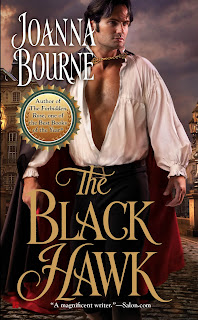Risky Carolyn Interviews Joanna Bourne
Today, I have the wonderful RITA winning historical romance author Joanna Bourne here to talk about writing, cats stuck in trees and her new book, The Black Hawk.
She’s giving away a book, so yay! Make sure you leave a comment and/or question for Jo.
There’s also an excerpt, hard-hitting questions from yours truly and over-all interview awesomeness.
The Book
1. Tell us about your book!
In the years they’ve known each other, Adrian Hawker — spy for England —and Justine DeCabrillac— spy for France —have been friends, allies, secret lovers and open enemies. Sometimes all at once. None of this, except the enemy part, is made easier by their countries slugging it out in Napoleon’s endless wars.
Now that the war is over, why are they still dodging knives and bullets? Who wants Justine dead, and Adrian blamed for it?
You can buy The Black Hawk at Amazon.
The Interview
I’m merciless, as you’ll see. Got more questions for Jo? Ask in the comments.
2. So, what made you decide to write about birds? That’s a very unusual theme for a Romance author. Are you an avid birder? We get Golden Eagles here when they’re migrating. One time one ate our neighbor’s rooster and came back the next day to finish. Has anything like that happened to you or a rooster of your acquaintance? Is something like that what sparked the idea for your Romance?
Do you know . . . I don’t understand titles. I just don’t.
I keep giving them titles for the books, and I think they are very good titles. Like, The Tycoon Spymaster’s Blackmailed House Guest. The publisher, however, doesn’t use any of my titles. They are polite about it, though.
(That’s a pretty awesome title. I wonder why they didn’t pick that one?)
So I was sitting on the computer typing in good suggestions like Harry Potter and the Deathly Spy, or Sense and Sensibility and Spies, or Where the Wild Things Are, Including Spies, or Spies and the Women Who Love Them, and the editor mails me.
“What about Black Hawk?” says she.
“You want to name it after a helicopter?”
“What helicopter?”
“The Sikorsky UH-60 Black Hawk helicopter,” says I.
Turns out nobody in New York publishing, or at least nobody she can buttonhole in the hallways has ever heard of a black hawk helicopter.
(Huh. That is SO strange.)
There’s a hockey team with this name. When I wonder why a Romance genre book is named Black Hawk, I also say . . . Why a hockey team? Are hawks found in the frigid wastes of the north?
Anyhow, I did not really think about birds while I was writing the book and I had to go back quick at the end and add a few references to ‘Black Hawk’ so folks would not be utterly bewildered by the title. I do not like to bewilder folks if I can help it.
We do not have golden eagles. We have turkey buzzards which are large and remarkably ugly. They’ve never made off with a chicken from me, because I do not actually have any chickens. Possibly I counted them before they were hatched at one time. The buzzards sit in a tree in great numbers and watch me as I pass. Waiting.
(One time a Red-Tailed hawk got IN our chicken coop. He was waiting for dinner to come to him, I guess. He flew out when my son came in, as he was, I suspect, more dinner than he wanted.)
I worry that the turkey buzzards will get the cat. But they don’t.
(The buzzards will wait until your cat is, uh. Never mind.)
3. What did spark the idea for your book? Do you have a favorite scene?
I had just barely set The Spymaster’s Lady on the shelves.
THEM: When is Adrian’s story coming out?
Me: He’s a minor character. Really, I wasn’t planning to write a story about him.
THEM: When is Adrian’s story coming out?
Me: He’s not suited to be a romantic hero. He has ethical issues.
THEM: When is Adrian’s story coming out?
Me: I have this timeline problem that means I can’t write his story when he’s young. It doesn’t work.
THEM: When is Adrian’s story coming out?
Me: November 1.
Here’s a bit of The Black Hawk:
She’d always been pale as the moon. Skin you could almost
see through. He used to lie beside her in the candlelight and
trace the line of a vein up her arm to the pulse in her throat, then
down to the mound of her breast. Or he’d follow one thin track
up her leg to the silky, soft nest he never got tired of playing in.
She was opaque now, as if the light in her had retreated to the
core of her. It was gathered up there, keeping the chill out,
keeping her life’s heat in.
Fate carries a sting in her tail. He’d wanted Justine back in
his bed. Now she was. But look at the price of it.
Doyle came up beside him. “Luke says she has a good
chance.”
“It’s his job to say that.”
“He’s too busy to lie.”
“Friends will always find time to lie to you. A heartwarming
thought in a cynical world.” He set his knuckles against her
cheek. Skin fluent as running water, sleek as air. He felt the
vibration inside from her blood pulsing.
Even after all these years, he’d still wake up in the middle of
the night, hard as a rock from dreaming about her. He’d never
stopped being hungry for this woman. “I wanted her back, and
here she is. Fate’s a perverse bitch.”
“Always.” Doyle slipped his hand inside the blanket, to Justine’s
shoulder, testing the temperature. “She’ll make it. She’s
hard to kill.”
“Many have tried.”
Her hair spread everywhere on the pillow. Light-brown hair,
honey hair, so golden and rich it looked edible. He knew how it
felt, wrapped around his fingers. Knew how her breasts fitted
into his hands. He knew the weight and shape and strength of
her legs when they drew him into her.
. . . The last time they’d exchanged words, she’d promised to kill
him.
4. I know that you and I share the trauma of a beloved cat being stuck in a tree. (Dear Riskies, my cat was 30 up a tree for 3 nights. Raul of Summit Tree Care rescued him for me. It was a terrible experience but then Raul was my hero. Jo was kind enough to send me consoling emails during the ordeal.)
Your story doesn’t have Raul the Tree Climber, but maybe you could share a little about that. Cat pictures kindly accepted! Will you ever write about a cat stuck in a tree?
There is a cat who lives at Number Seven, Meeks Street. A succession of cats, actually, over the years, all of them named by Adrian. I don’t know if the cat has ever appeared in a story, but it’s there.
Definitely, if I can ever manage to write that cat in, I will.
5. I love love LOVE the late Georgian era. Can you tell us a bit about why you write in that period? Also, I love the way Georgian sensibilities linger in the Regency. Any observations about that?
I like to say I write between busks and bustles. That is, my heroines are in one of the periods of history women are not weighted down with thirty pounds of clothes and twenty minutes lacing themselves into and out thereof. Pretty clothes, comfortable clothes, and innately democratic clothes. Women right down the social scale could produce a reasonable facsimile of fashionable garments.
And it’s one of those times the basic assumptions of society changed. So interesting.
6. You write the most wonderful heroines. Can you tell us about the heroine of this book? If she had a cat, and it was stuck in a tree, what would she do?
Justine is a child of the French Revolution. Life is difficult. It’s made her tough. It’s made her a fighter. It’s made her do things she’s ashamed of. The only time she can let down her guard is with Adrian.
She’s loyal to everything that matters to her, because she knows it can all be swept away in a moment. She’s had that happen.
If Justine had a cat, she would be adamantly protective of that cat. She’d arrange for somebody to go up in the tree and get the cat down.
How?
Blackmail, probably. Threats. Cunning plans. Bribery.
I don’t know how she’d do it, but somebody would go up that tree and rescue the feline.
7. When I read your first book, The Spymaster’s Lady, I remember thinking (among many other things) that you had completely nailed a heroine whose first language was French. To this day I am in awe of your use of language (in all your books). I heard later that you speak fluent French. True? This linguistic otherness is true of your other heroines, too. Tell us a bit about your take on that aspect of your writing.
I wouldn’t say I’m fluent in French. It’s more a workaday grasp of it.
In Spymaster’s Lady it’s important the protagonist is utterly French. This is how she sees herself. It sets her up to have something to lose. It makes her ultimate choice just that much more difficult. When she speaks in a very ‘French’ way it emphasizes this ‘Frenchness’ which plays an important part of the story.
Where the mere fact of being French is not one of the points of the story, it’s easier to use a lighter hand with the character’s voice.
I’m all for using the least possible dialect or accent to make the point you need to make. A little word choice. A little idiom. To make life easier all round, you try to give your folks a reason to be eloquent and fluent in English.
8. What’s next for you?
I’m just beginning on Pax’s story. We’re in the same fictive world here. I’m just beginning it, so I don’t know quite where we’ll end up, but it looks like it’ll be set half in England and half in France.
Book Giveaway!
Jo will be giving away a copy of Black Hawk to some lucky person in the comments trail, so leave a comment!
Rules: Void where prohibited. No purchase necessary. Leave a comment by Midnight (Pacific Time) Thursday 11/3.




